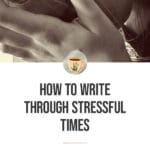Unfortunately, because of the introspective aspects of their work, writers tend to be more susceptible to the stresses within their lives. When a writer falls under extreme stress, it can take much longer for him or her to recover. And for most of that time, the creative juices simply stop flowing. This makes learning how to write through stressful times an essential skill if you want to get paid to write.
Let's face it, the past few months, maybe even the past few years, have been filled with stress. For some of us, this stress has been completely unprecedented. The country has been locked into one of the most controversial election seasons I can remember (no need to mention how many elections I can remember 😉 ). Politics, in general, tend to leave people angry and stressed out. Add to that the holidays and just normal stress in daily life…rarely does a day go by without at least a moment of intense stress. Now it's no secret, stress can really mess up your train of thought — it can knock you off track and take days or even weeks to recover.

We can't always control when stress hits us, and we can't always make it go away quickly. But we can lessen its effects on us. So, I have compiled a list of all my favorite ways to power through the stressful times and keep writing.
Tips to Help you Write Through Stressful Times
Take a break.
I know, taking a break isn't exactly powering through the writing, is it? But here's the deal when you're trying to write under stress — when the stress blocks you from being able to write, anxiety kicks.
How are you going to get that book finished?
What if you can't?
How will you pay the bills?
Oh come on. You're better than this.
Just write.
Sound familiar?
I repeat. Take a break.
Go for a walk. Go check the mail. Get a bowl of cereal. Whatever you need to do to stop hammering on yourself for being affected by the stress. Find your happy place. Force yourself to smile even though you don't think there's anything to smile about.
Whatever it takes to stop beating yourself up.
Remind yourself that stress affects you and your work differently than it does other people, and that's okay. It doesn't make you weak or incompetent.
And the sooner you can remind yourself of that, the sooner you can get back to work.
Use your emotions to your advantage.
If you are like me and you tend to get angry under extreme stress, write your anger scenes. Your fights, your murders, your arguments. Even if you're no where near that scene in your book.
Even if you never planned on having a fight scene in your book.
You may not even end up using this scene. I have a stack of fight scenes that have been deleted from works for that exact reason: they didn't fit into the book. But nothing gets the writing muscles working like pounding out an angry scene. Before you know it, you've typed out a thousand words and you're on a roll.
This method can work for you nonfiction authors as well. Have you ever tried typing out something important using the passion and drive of your anger? Perhaps a message about bullying or abuse in your next parenting book.
Anger is a powerful force if you can use it.
Give yourself some praise for everything you've already accomplished.
Take some time and go over some of the other things you've written. Go over your favorite pieces, no matter how old or recent they are. Read them and revel in how well you did in writing them — the impact they've made on your or on their audience, the effort you put in, and the fact that you finished.
When people are stressed out, it's too easy to dismiss everything as negative, even when it's good.
Our eyes lock onto mistakes with laser precision and magnify them for us. Our minds focus in on every bit of self-doubt we have and without realizing it we sabotage ourselves by refusing to look at anything positive around us.
Take a few minutes and force yourself to look at the things you've accomplished and give yourself the proper acknowledgement and praise for a job well done. You will be amazed at how much better you feel just by giving yourself a compliment. It won't be enough to completely end your stress, but it will be enough to motivate you to keep going.
So let your older writing inspire you.
Get rid of all other stress-inducing distractions.
I don't know about you, but it seems like in this house, stress just begs for more stress.
When I'm in a bad mood, Murphy's Law will dictate that's when I will trip over my cat and stub my toe. My Internet connection will slow down, and my dog will start begging to go outside.
When I'm stressed out, the world stresses out around me and it feels like everything works against me.
Of course, I know that's not true. Obviously it's all part of a spiral that I'm sinking into. But once you get caught up in that spiral, it's a lot harder to force yourself back out of it.
The better option is to recognize the things that could annoy, irritate, or otherwise add to your stress before sitting down and trying to write. Close out extraneous programs running on your computer to make sure it runs as fast as possible. Check your network and Internet settings. Make sure all the tools that you will need are within your reach and viewable so you aren't getting further stressed by looking for something.
And stay away from anything that will add to your current stress. Stay off Facebook and Twitter, away from the political arguments. Turn off your phone. And sit down before you stub that toe. Anything you know has a tendency to bother you, either get rid of it, hide it, or temporarily disable it the best that you can.
Write fewer words more often.
When all else fails, and you're not able to take a break or write out an angry, stressed out scene, then try breaking up your words into smaller exercises. It may not be all that efficient, but it can definitely work.
Write for a ten minute sprint, then take an hour or two to go to something else and take a break. Then sit down for another ten minute sprint.
By writing in sprints, you can still bang out several thousand words throughout the day without forcing yourself to sit and write all day. These sprints will help make up for the fact that you need to take some extra time to yourself through the day.
Writing Itself Can Also be Therapeutic
Therapists have been using writing as a tool to help their clients through depression and anxiety for eons. The act of writing about our emotions is hugely introspective. It allows us to put a logical twist to our emotions, seeing cause and effect of thought and action. It allows us to work through our mental anguish and see it resolved, at least on paper if not in action.
So, if push comes to shove and you can't bring yourself to work on your actual writing projects, try writing through whatever you're going through.
You may find that it's the best thing for you.
Did you enjoy this article? Here are some more posts about writing you may like:






Great tips! Stress can definitely be a big detractor from writing, but it can also be utilized to your advantage.
Thank you for your tips. I have been attempting to write my daily prompts and I find anger getting in my way of what is supposed to be a funny scene.